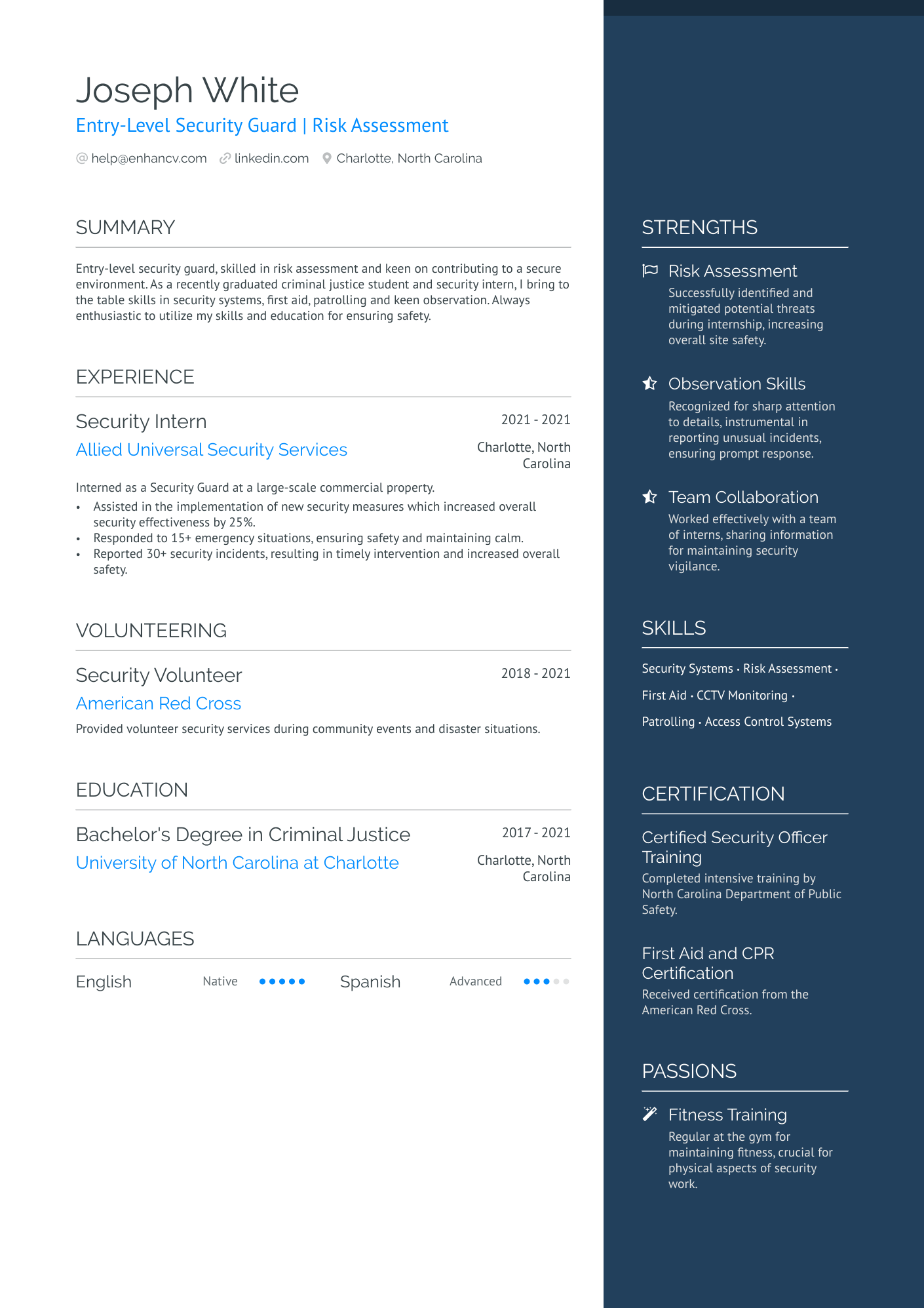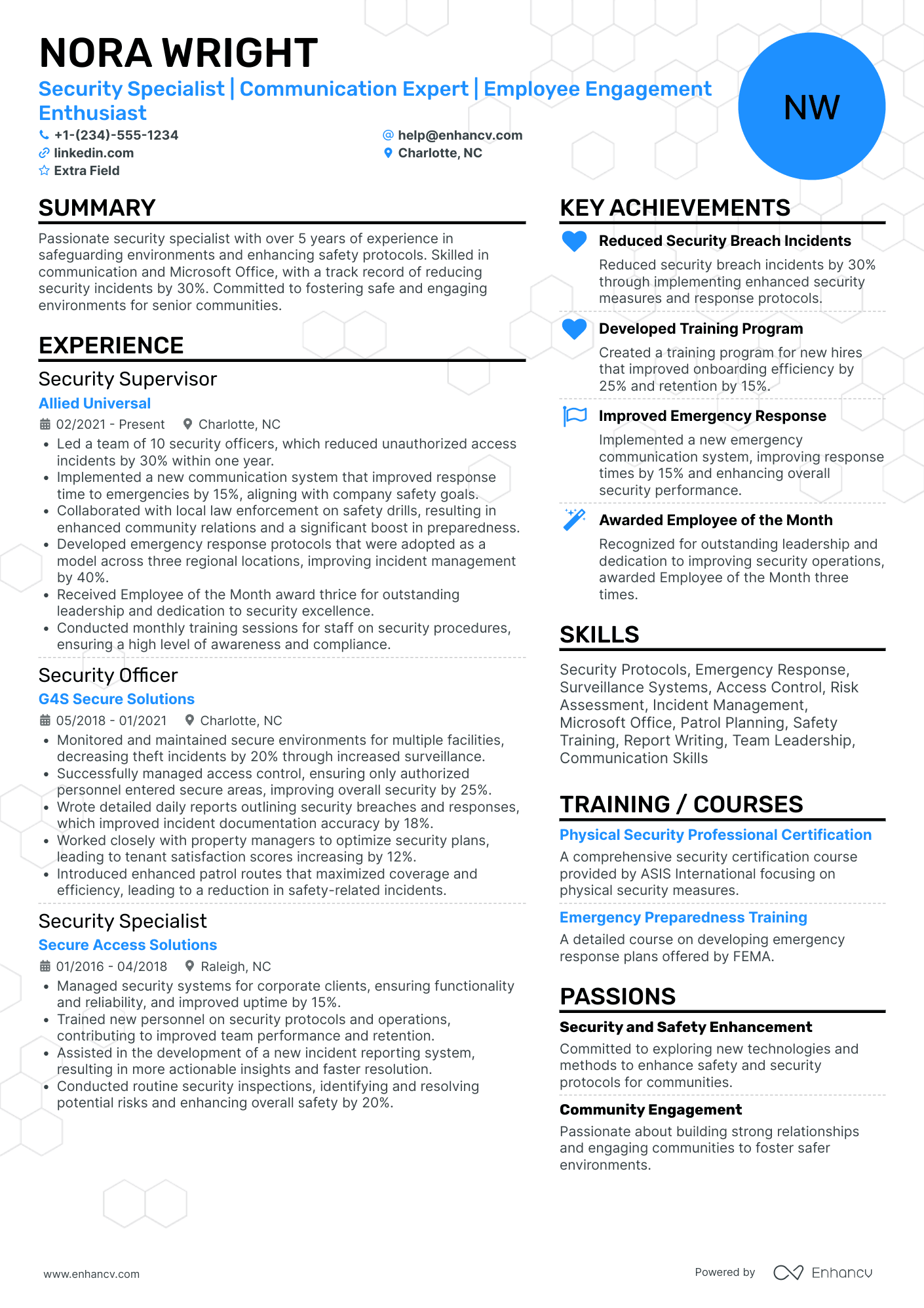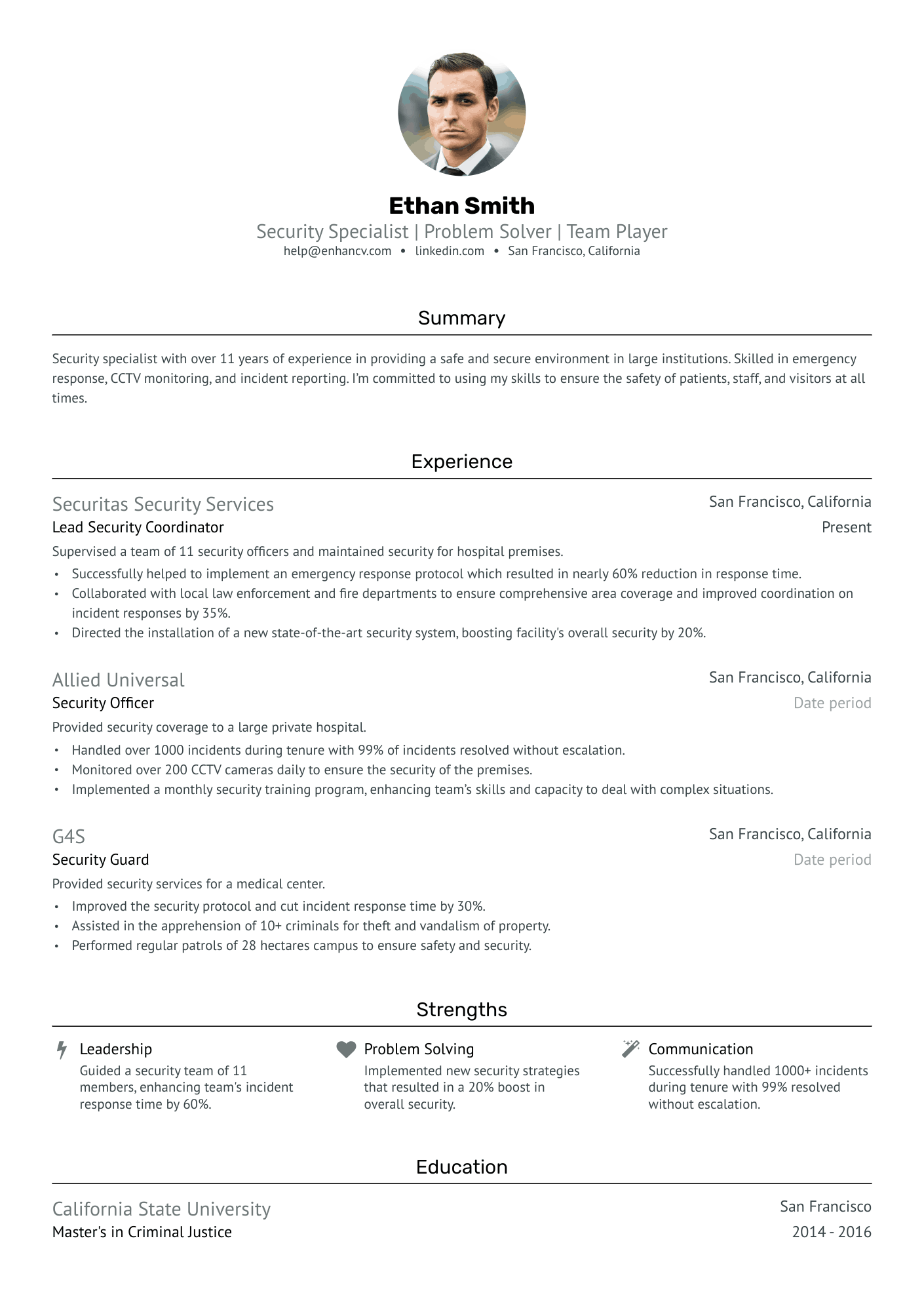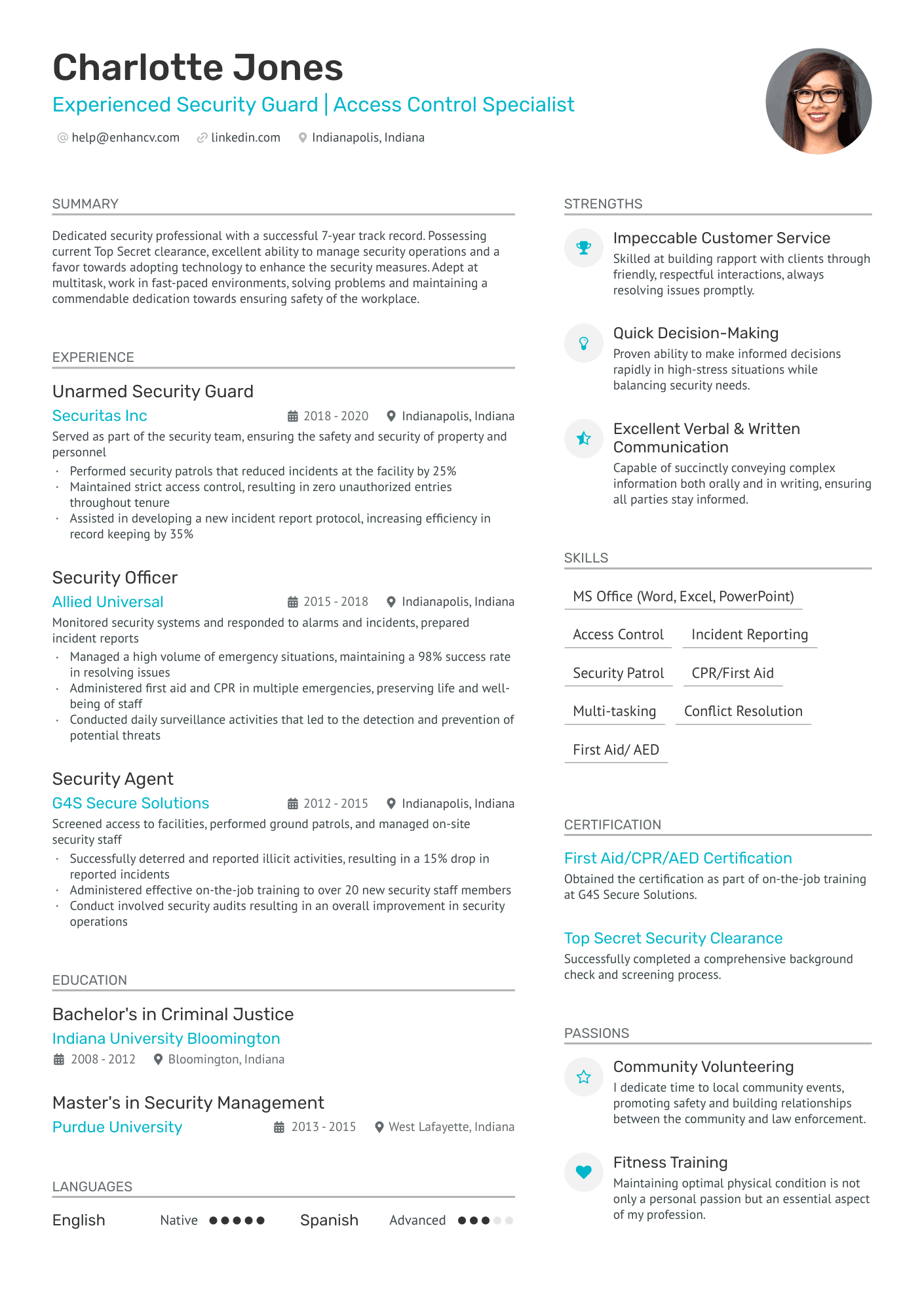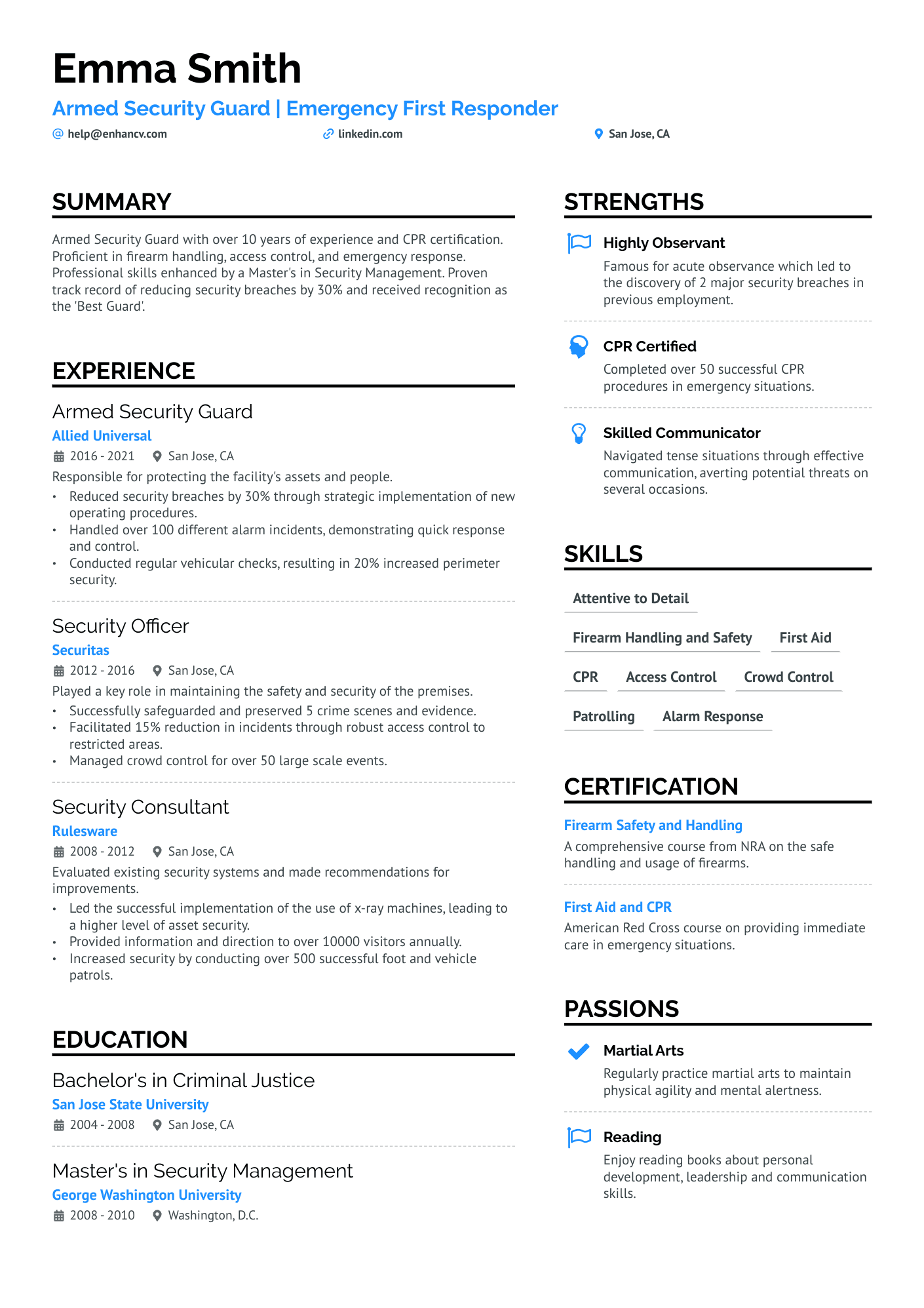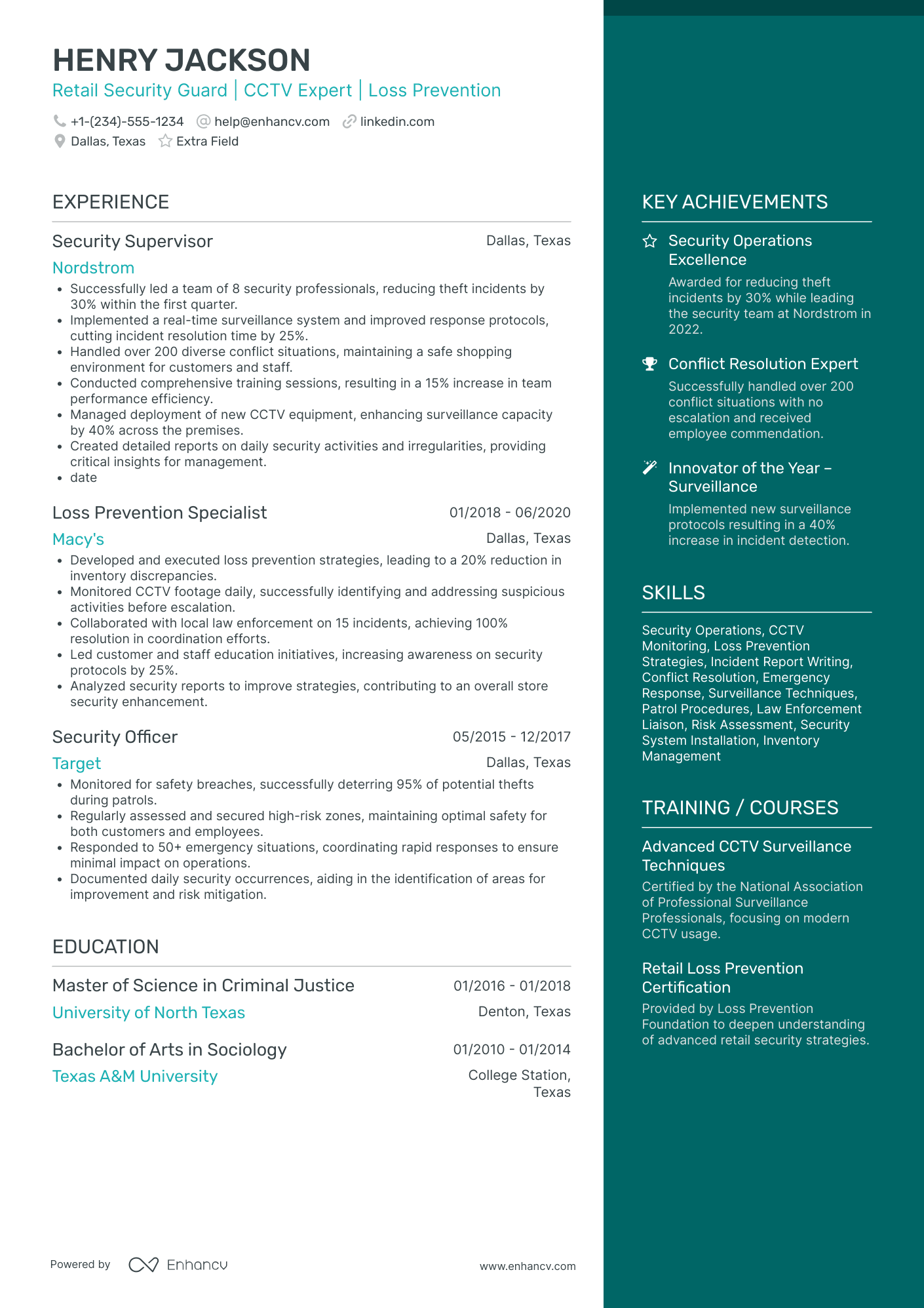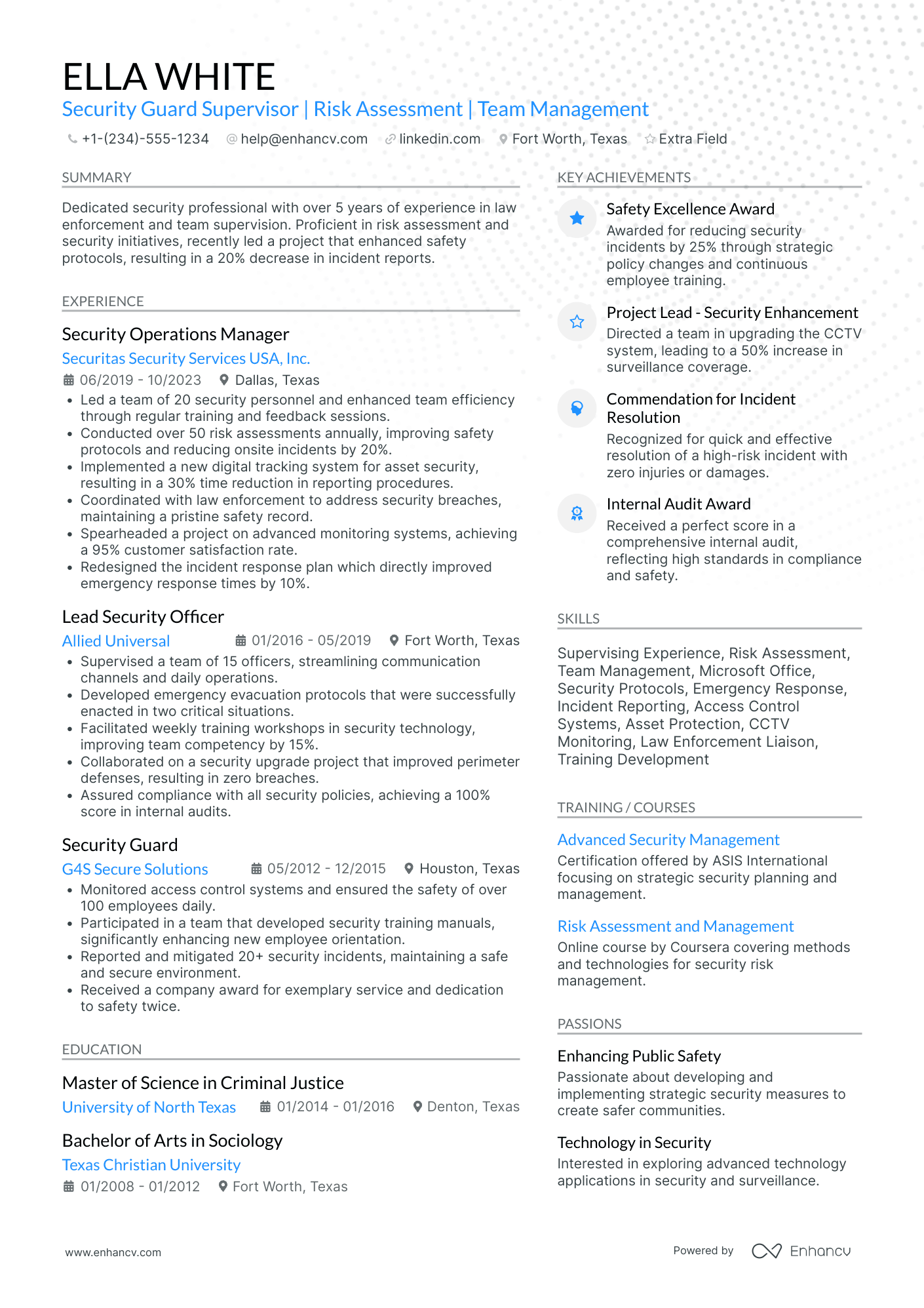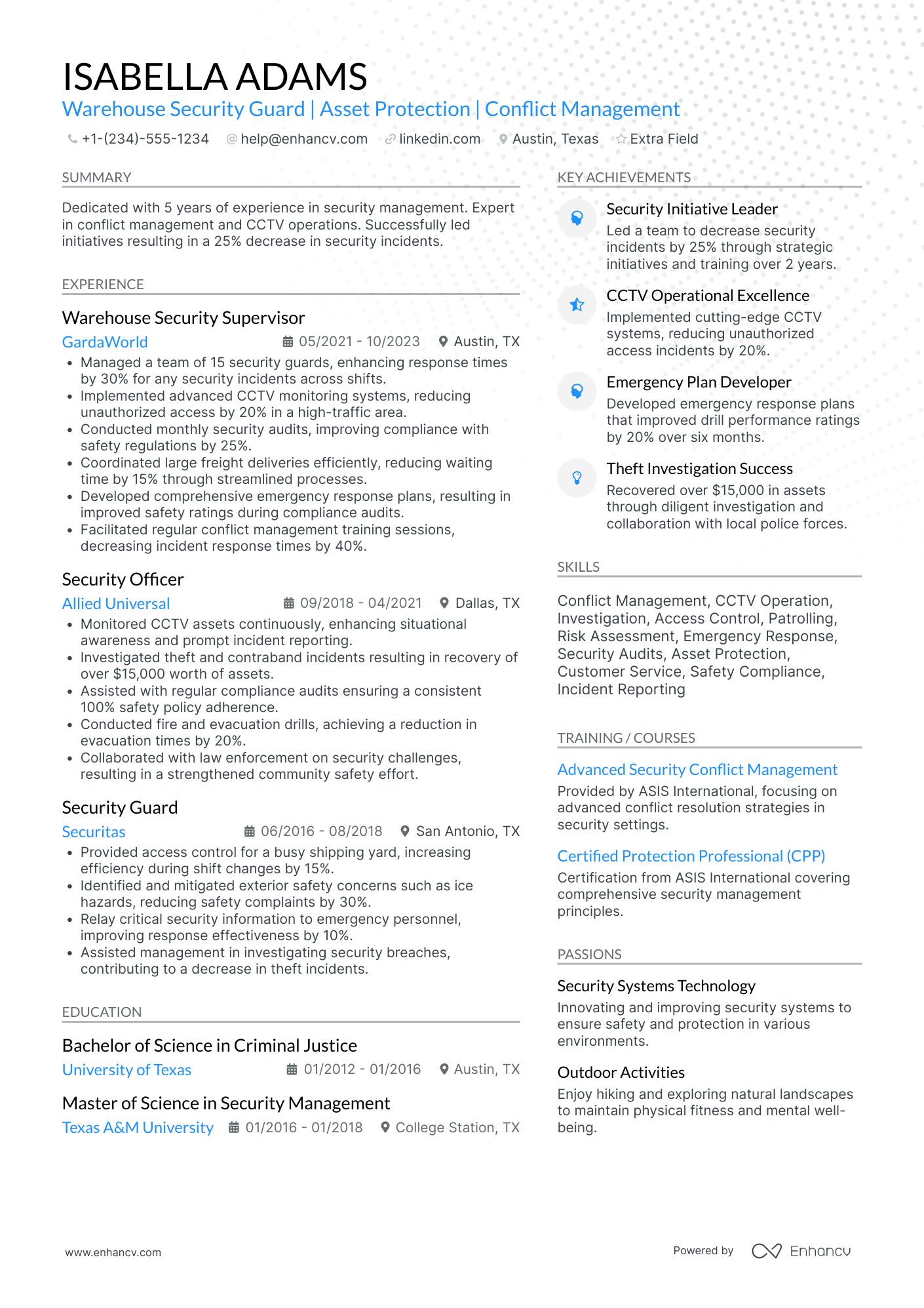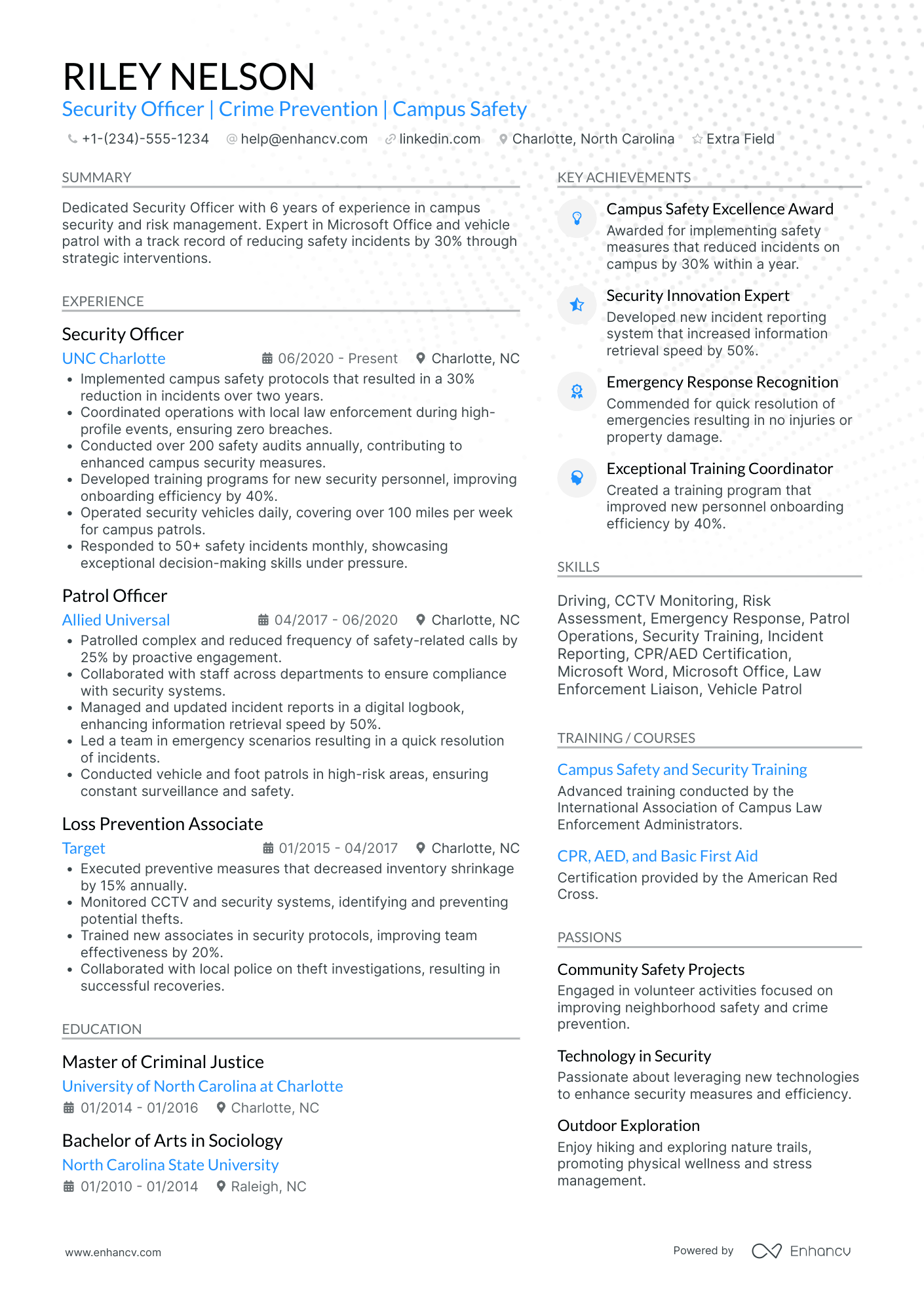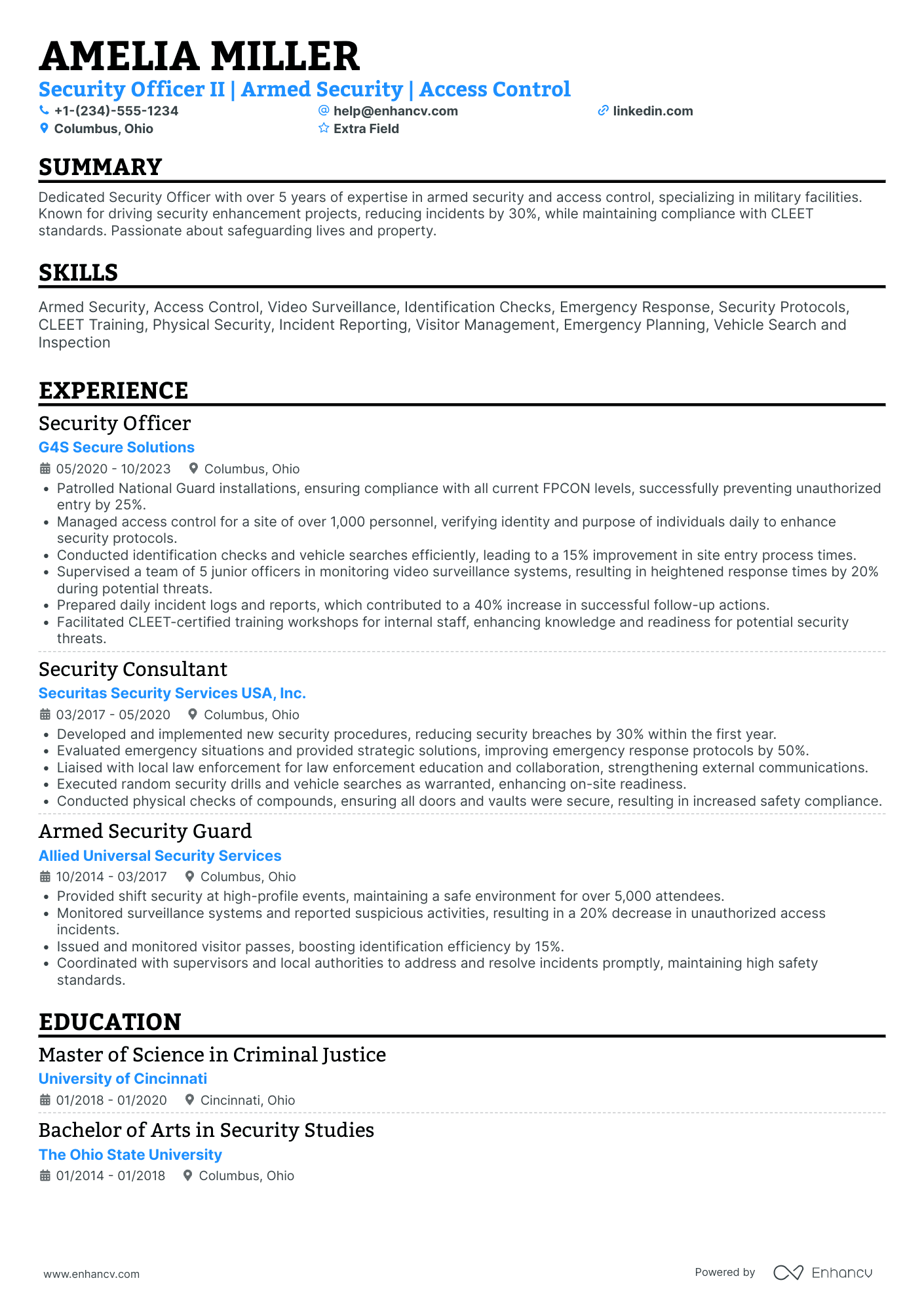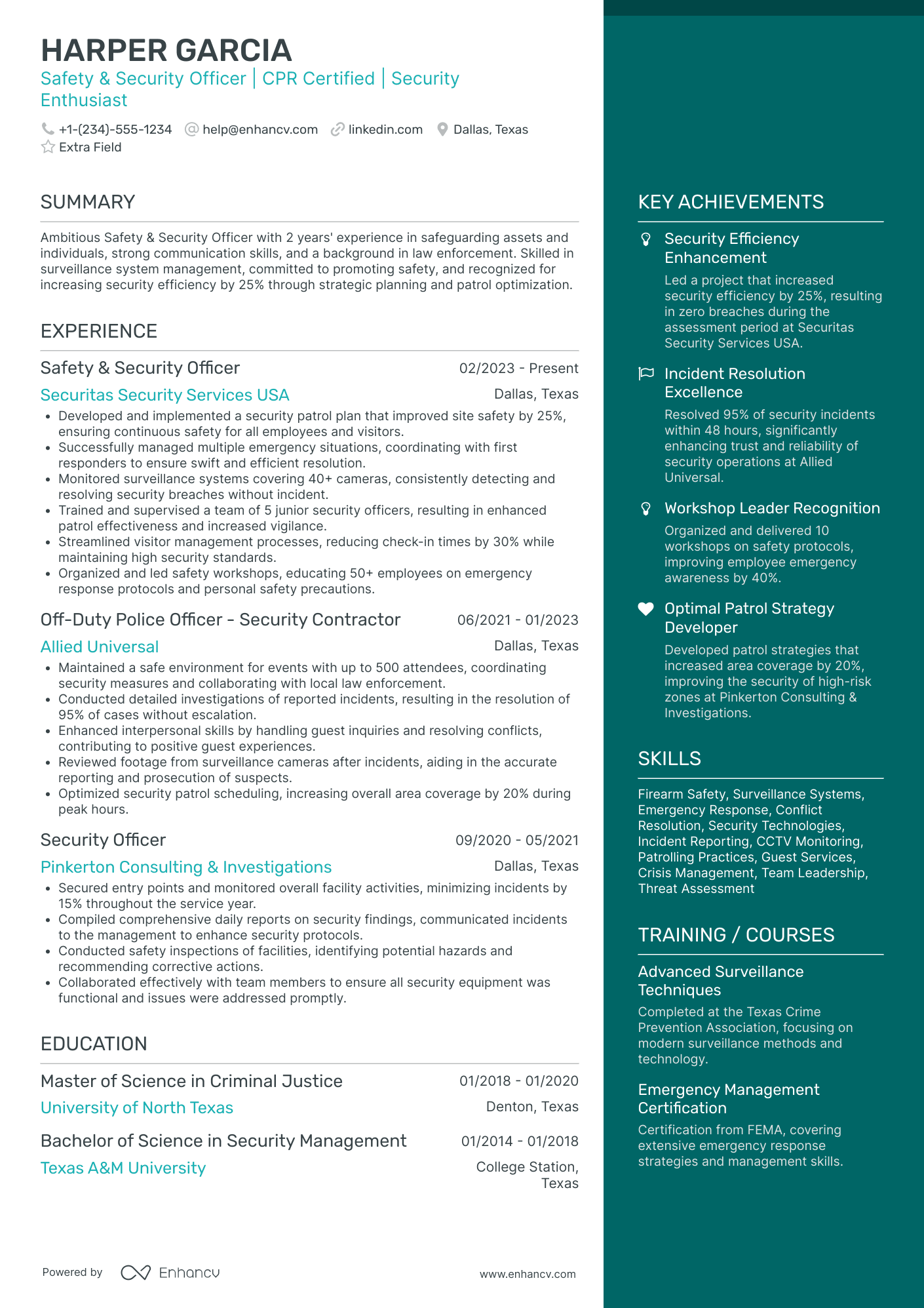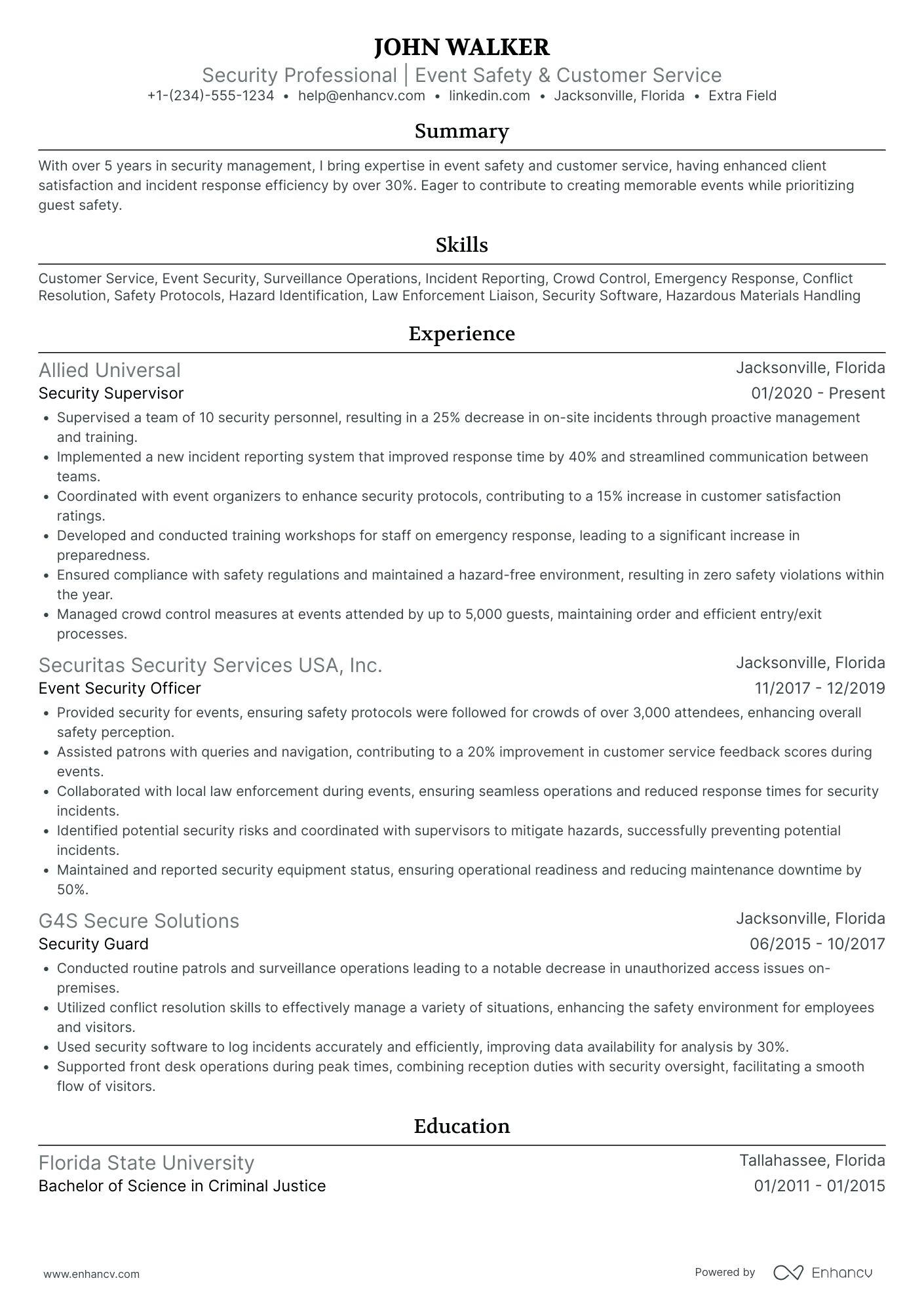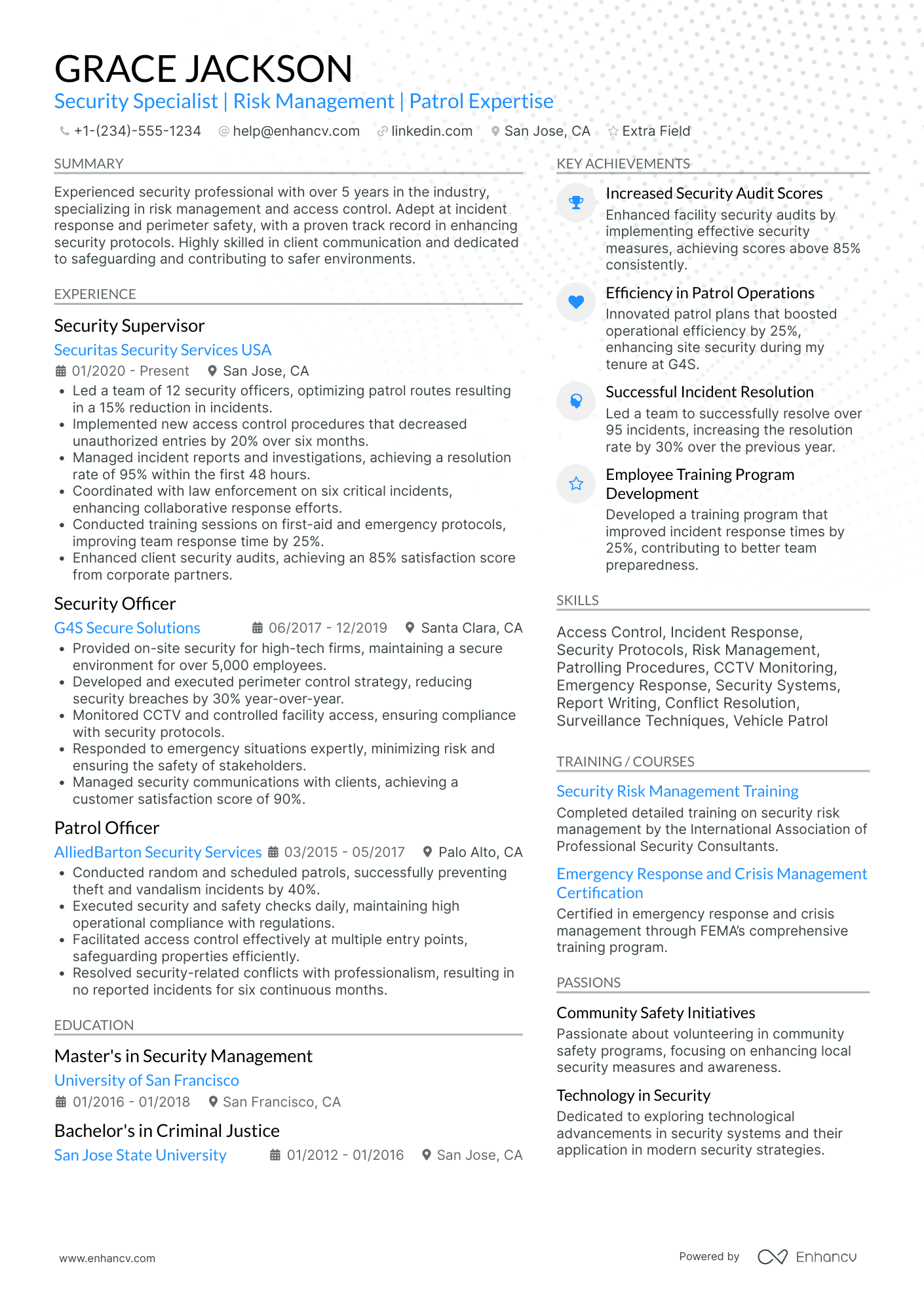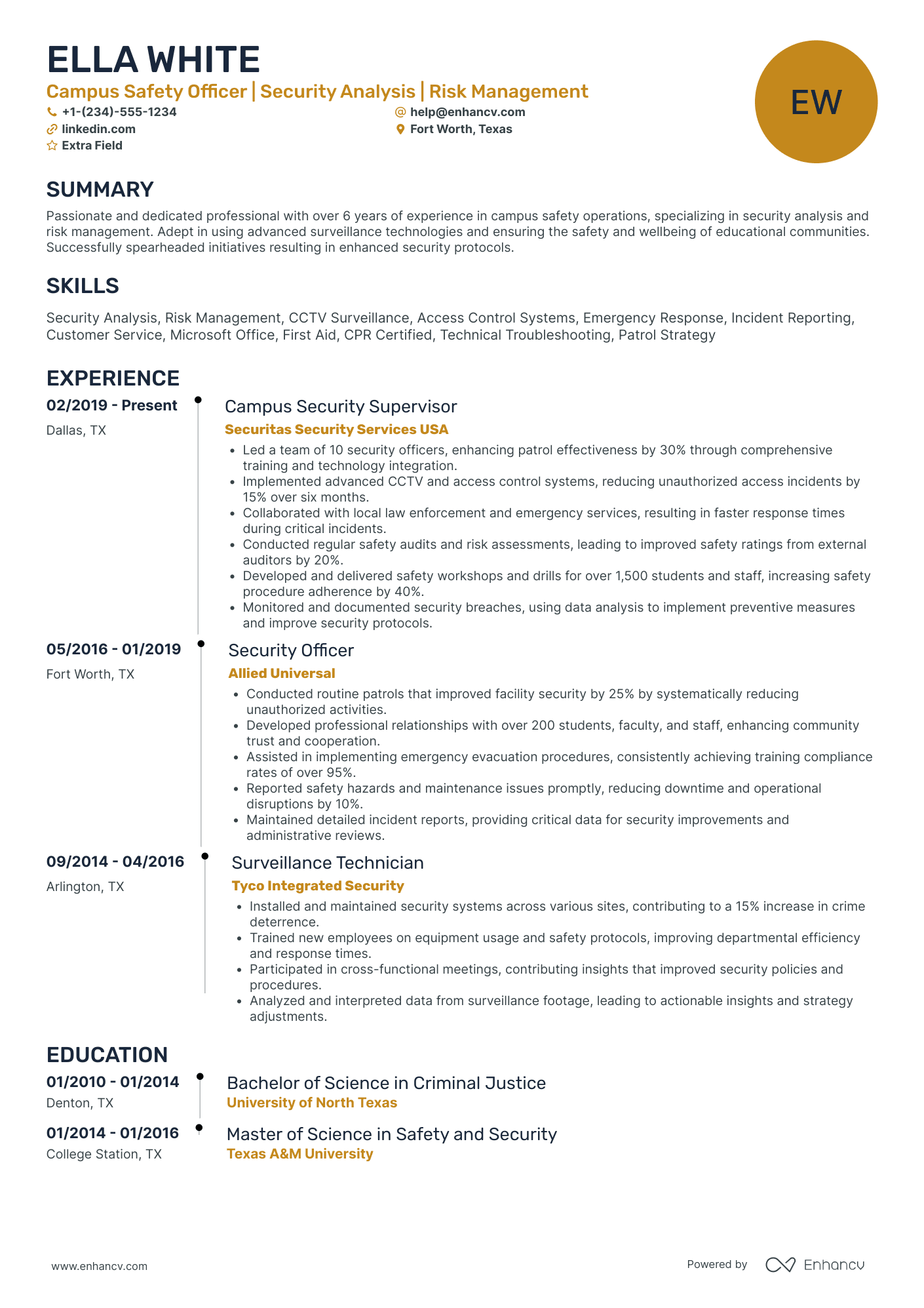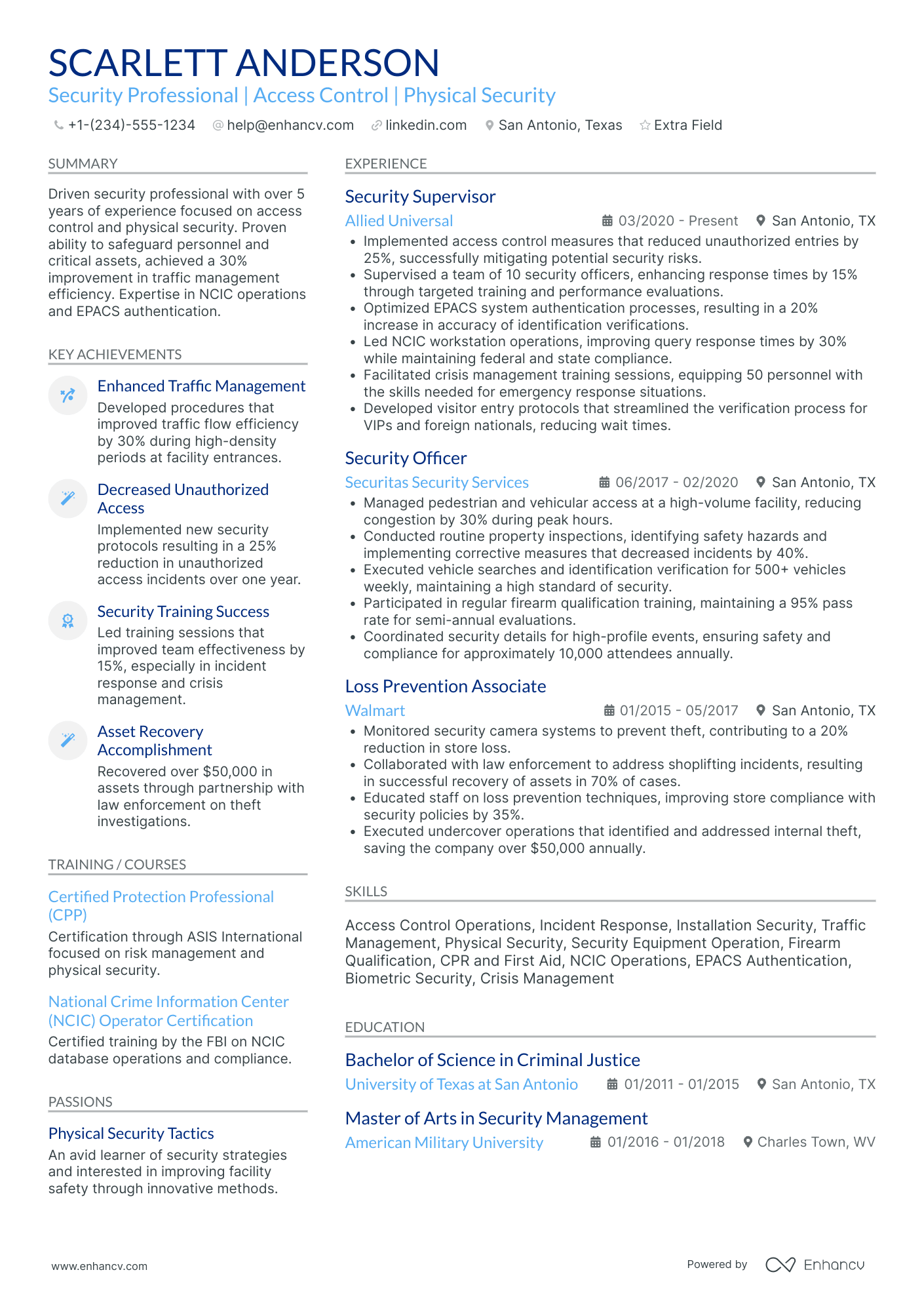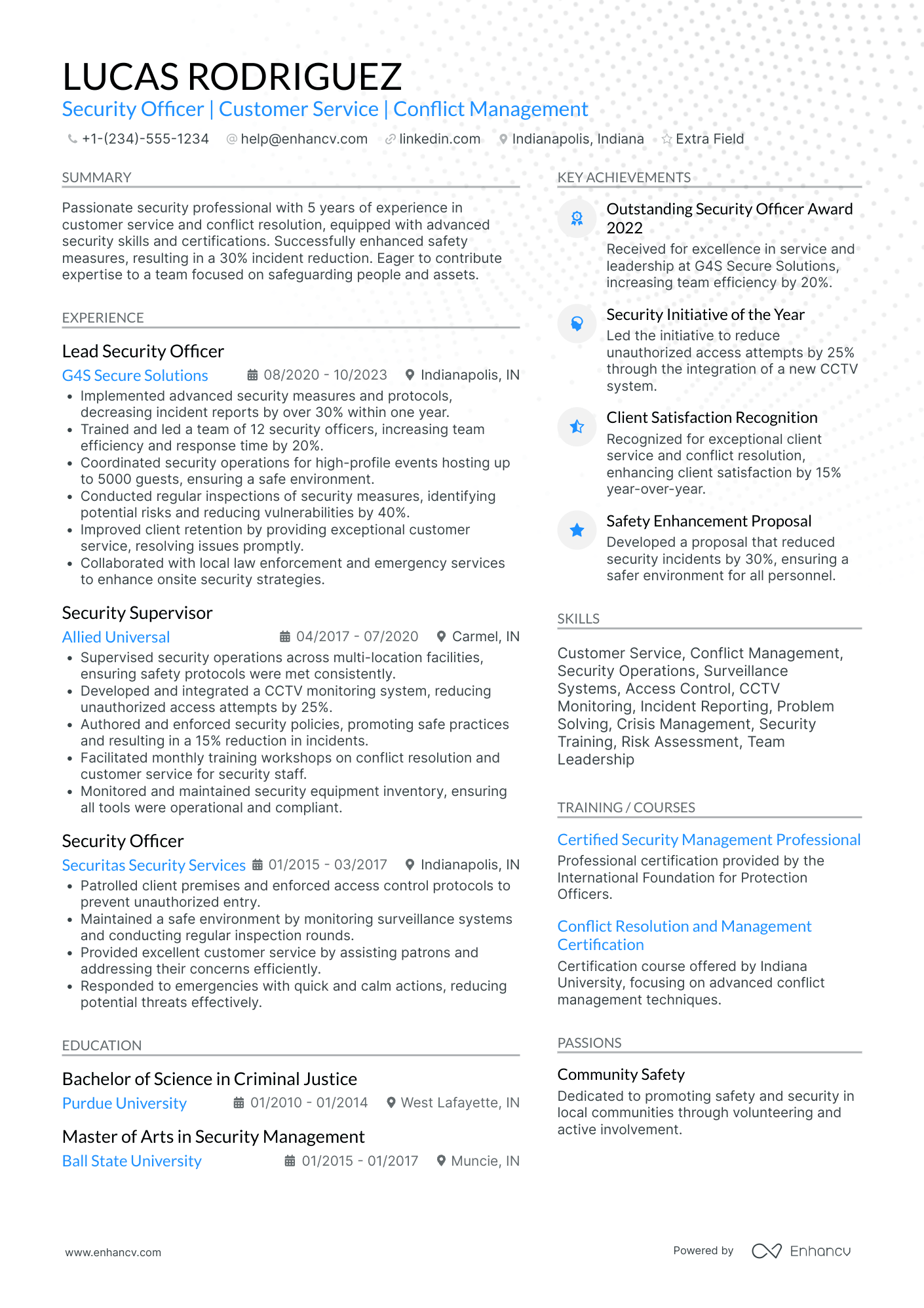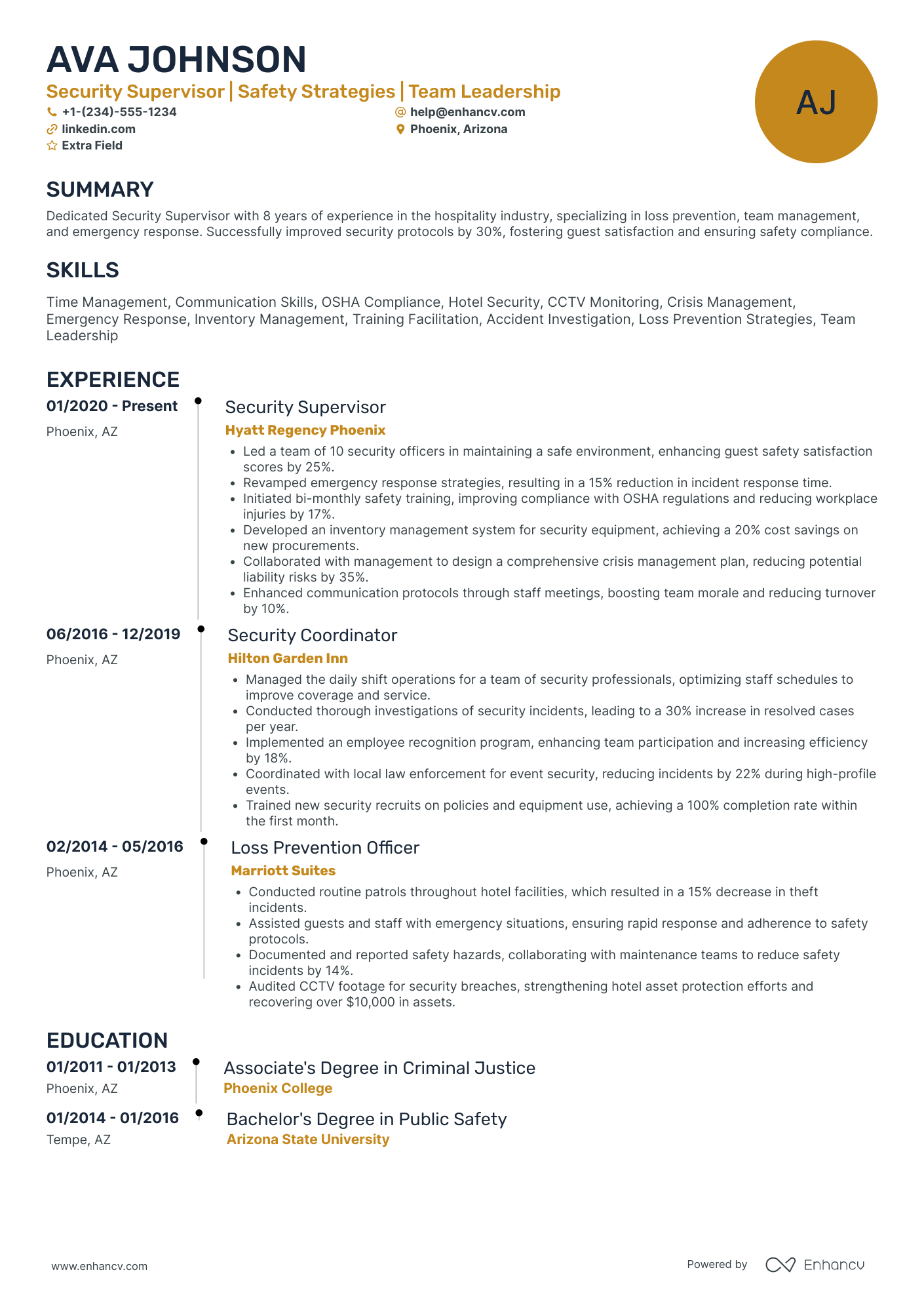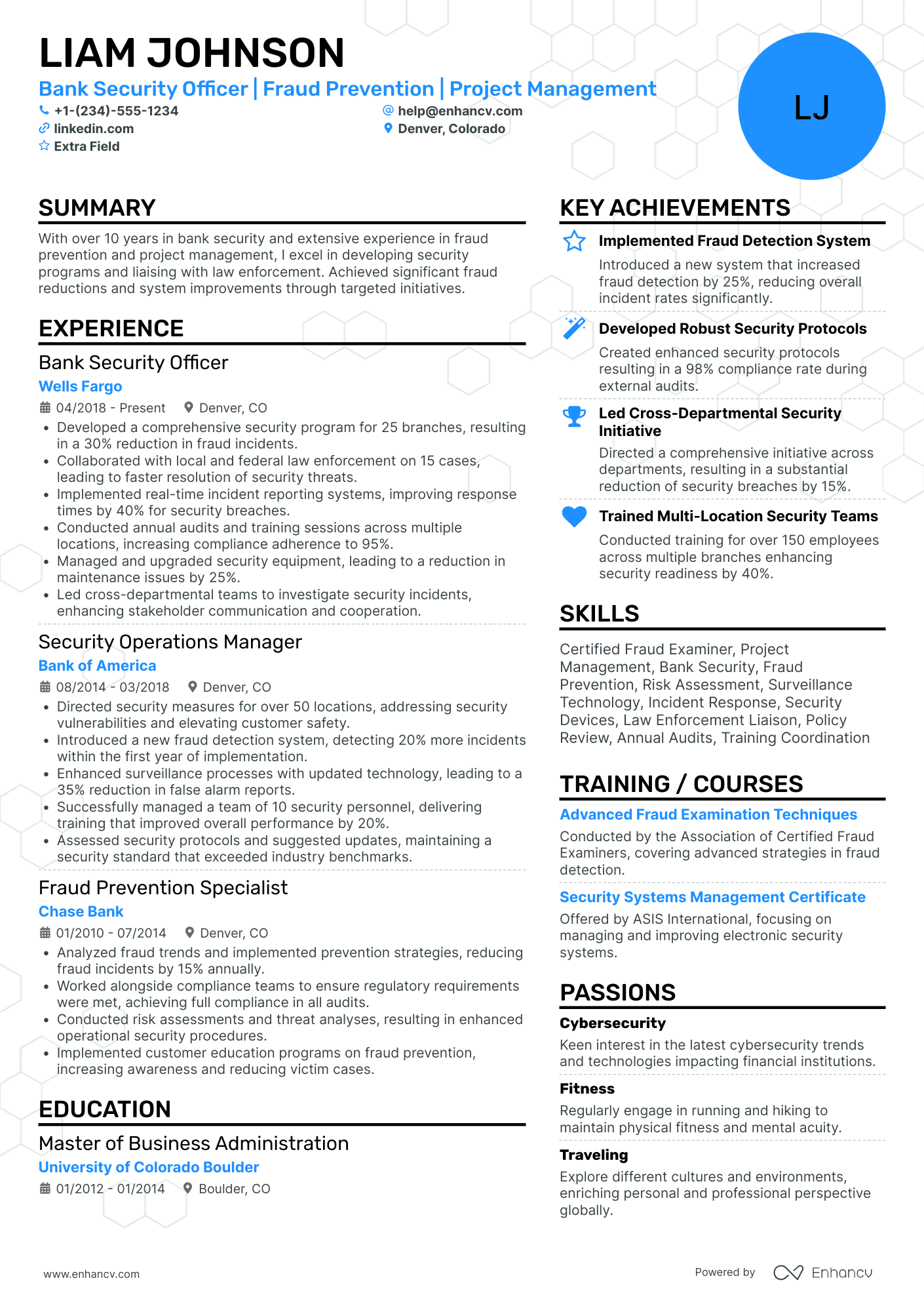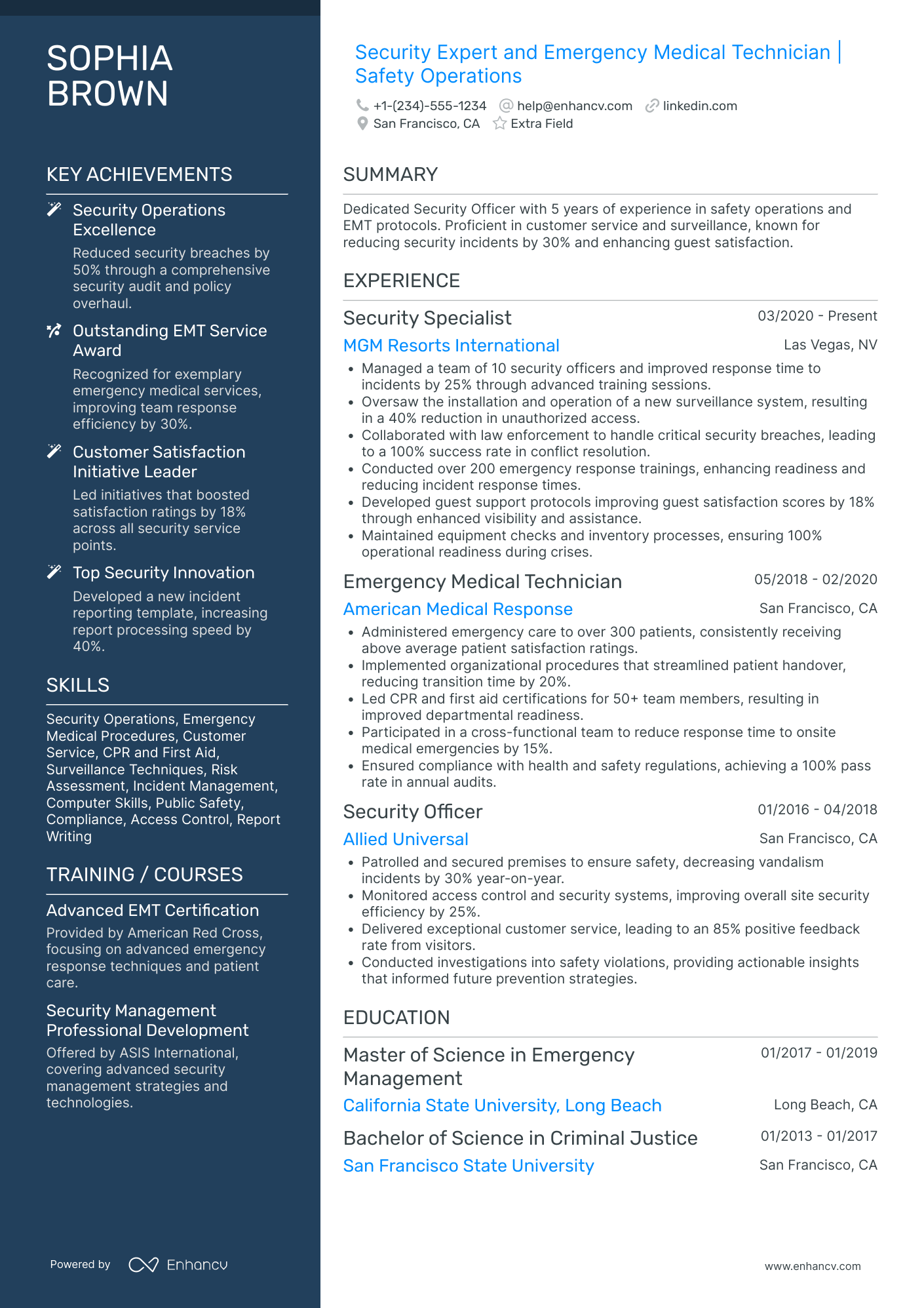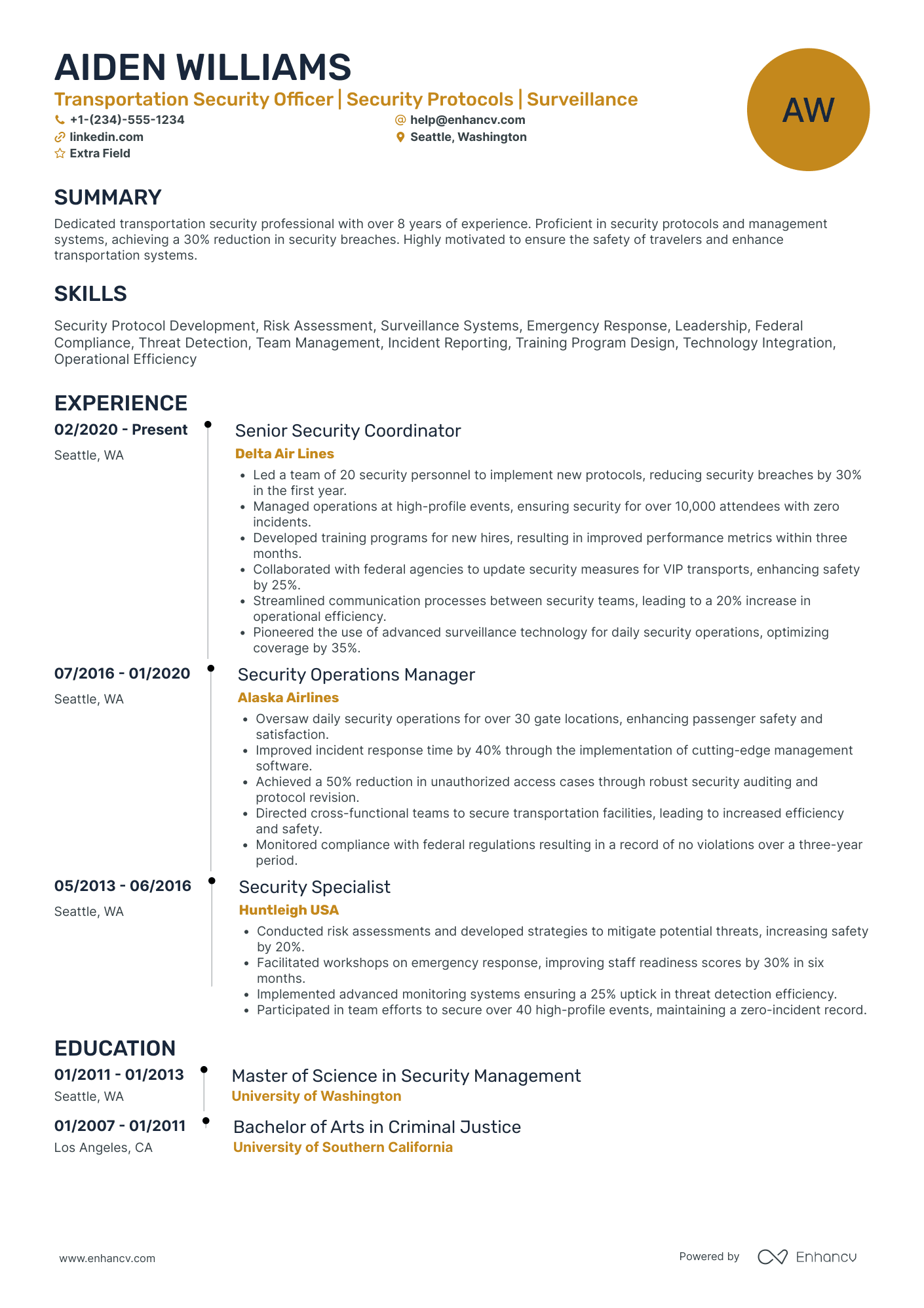Remember that scene from The Bodyguard when Rachel tells Frank he doesn’t look like a ‘tough guy,’ and he replies that that was his disguise? It turns out, Frank was on to something. In reality, the effectiveness of a security guard, much like a bodyguard, often lies in their ability to blend in—not sticking out until it's essential not to. Both roles share this quality of unassuming presence coupled with acute alertness.
When crafting your resume, however, forget about blending in. It has to stand out. Here, you should think about the best ways you can convey this precious mix of discreet vigilance and prompt readiness.
In this guide, we'll explore how to build a security guard resume that captures the essence of your responsibilities and skills. Here’s what we’ll cover:
- How to choose a resume format that matches your experience and achievements.
- How to describe and quantify your work experience in a way that will impress recruiters and is optimized for applicant tracking systems (ATS).
- How to highlight your skills in your resume and how to prove you have them.
- How to write a professional summary that captures attention from the start.
By the end of this guide, you'll be ready to present a resume that doesn’t just say, “I can look tough,” but rather, “I can handle tough situations.” Let’s get started and turn that paper into your first line of defense!
Are you interested in any other security-related position? Explore the examples below:
- Case Manager Resume
- Firefighter Resume
- Law Enforcement Resume
- Investigator Resume
- Police Officer Resume
- Security Manager Resume
- Incident Manager Resume
- Security Officer Resume
- Fraud Investigator Resume
- Security guard Cover Letter
How to format a security guard resume
The key to building a well-organized resume is to prioritize clarity and relevance to the security field. Let’s start by defining an effective resume format that would allow for all your skills and experience to shine through.
- Reverse chronological layout: This format lists your work experience in reverse chronological order, starting with your most recent job at the top. It’s most employers’ favorite because it easily outlines your career progression and responsibilities in each role. Plus, it’s easy for hiring managers to scan and aligns well with ATS.
- Functional layout: This format focuses on your skills and qualifications rather than your chronological work history. It allows you to cluster your experiences under functional skill categories (e.g., Surveillance, Crisis Management, or Technical Skills). If you want to emphasize specialized training or certifications, this is your best option.
- Combination (hybrid) layout: It combines both the chronological and functional formats to highlight key skills upfront, followed by a chronological list of jobs.
PRO TIP
Tailor your resume for each application, emphasizing the experiences and skills most relevant to the specific security position. Use keywords from the job description to enhance your resume’s ATS compatibility.
Here are a few more resume formatting tips.
- Font: Use professional fonts like Arial, Rubik, Lato, or Volkhov in sizes between 10 and 12 points. Anything less would be difficult to read.
- Margins: Another factor contributing to your file’s readability is the resume margins. Keep them between 0.5 to 1 inch on each side.
- Length: The preferred resume length is one page. Longer documents are chosen by C-level candidates or academics.
- Header: Include your name, phone number, email, and а link to your LinkedIn profile. If you’re considering adding a photo, make sure it’s specifically requested in the job posting. If not, don’t do it, as it’s against the regulations in some US states.
- Resume template: Choose a clean, traditional template that will help you come across as the diligent and level-headed candidate that you are.
- File formatting: Save your resume as a PDF to preserve formatting, unless specified otherwise in the job listing. Name your file professionally, like “FirstName_LastName_SecurityGuard_Resume.pdf”.
- Proofread: Your precision in work should translate into your spelling and grammar. Use the button below to check if your resume is error-free.
Is your resume good enough?
Drop your resume here or choose a file. PDF & DOCX only. Max 2MB file size.
Below are the most important sections you need to include in your resume to enhance its ATS analysis.
The top sections on a security guard resume
- Include a professional summary to showcase your top security skills and experience.
- List relevant security experience to highlight your background in the field.
- Detail relevant skills and certifications that demonstrate your qualifications.
- Mention any formal training in your education section.
- Add a technology proficiency section to show your ability with security systems.
Presented effectively, your resume should communicate the right message. Here’s what recruiters will value the most when scanning your resume.
What recruiters want to see on your resume
- Relevant security experience: Recruiters look for specific, previously held security roles to ensure you have practical knowledge and situational awareness.
- Physical fitness: Physical capabilities are essential for handling potentially strenuous situations, which is why they are prioritized.
- Certifications and licenses: Having the required certifications, like a security guard license or CPR training, assures recruiters of your legal and professional readiness.
- Technology proficiency: Proficiency with security-related technology is crucial as the industry becomes more tech-driven.
- Crisis management skills: The ability to manage and respond to emergencies is critical for a security guard.
Now, let’s dive into each of the above-listed sections, starting with the most prolific one — your resume experience.
How to write your security guard resume experience section
The experience section on a security guard resume should not only list your prior jobs but also highlight the impact you made there. A common mistake job applicants make is to list all their work achievements regardless of their relevance to the desired position. This is like a security guard monitoring every single person who walks past a building, rather than focusing on those who actually enter.
To avoid this, be selective with the details you give. They should align perfectly with the job requirements which makes your resume more effective and targeted.
Let us show you what we mean.
- •Managed security operations for a retail chain
- •Provided security services for various public events.
- •Coordinated with law enforcement during incidents.
This experience section is a bit too broad and doesn't give much away. For instance, when they mention managing security operations for a retail chain, what does that actually involve? Did it lead to fewer thefts or a safer shopping environment? It'd be much stronger if they could share some specific achievements or ways they've really made a difference in their past roles.
Now, look at the improved version.
- •Delivered comprehensive site training to new security staff, enhancing overall team knowledge on security protocols, and reducing onboarding time by 30%.
- •Assisted in risk management and loss prevention in a retail setting, contributing to a 15% year-over-year reduction in shoplifting incidents.
- •Led the transition to a new access control system for a 500+ employee office, drastically reducing instances of unauthorized access.
This experience entry really hits the mark. For example, when the candidate says they delivered comprehensive training to new staff, it's clear they didn't just show them the ropes—they also cut down onboarding time by 30%, which shows efficiency.
Plus, helping to reduce shoplifting by 15%? That's solid proof they know how to handle risk and prevent losses. These strong examples show the security professional here can make a real impact.
In the following passage, we'll dive deeper into how adding numbers and figures to your experience section can boost your application.
According to a Gitnux article, almost 25% of security guards in the United States are women. The employment rate in the sector is over 72%, indicating an extremely high demand for security professionals.
How to quantify impact on your resume
When reading your resume, clients and hiring managers will be looking for clarity, relevance, and evidence of proficiency in security practices. They’ll focus on specific attributes such as reliability, attention to detail, and previous success in similar roles, but more importantly, they’ll need concrete evidence for them.
Here are some suggestions for enhancing your security guard presentation:
- Quantify the area size you were responsible for patrolling (e.g., square footage or acres), demonstrating your ability to manage and secure large, complex environments.
- List the percentage reduction in security incidents during your tenure, showing your effectiveness in enhancing safety.
- Specify the number of surveillance systems you have operated or implemented, highlighting your technical proficiency and capability to manage modern security tools.
- Mention the number of training sessions you've conducted for fellow security personnel, underscoring your leadership and commitment to team development.
- Indicate the decrease in onboarding time for new hires due to your training methods, showing your efficiency in getting new staff up to speed.
- State the number of emergency responses you have led or coordinated, proving your ability to handle high-pressure situations effectively.
- Provide the percentage increase in compliance rates with security protocols under your supervision, reflecting your attention to detail and adherence to standards.
- Detail the number of physical security audits you have completed, showcasing your thoroughness and proactive approach to security management.
Next, we’ll explore how entry-level security guards can articulate their motivations for getting into this high-risk profession.
How do I write a security guard resume with no prior experience
Depending on your target position (armed security officer, loss prevention officer, custom protection officer), you’ll need to tailor your resume to the job description and try to replicate the same keywords on your document. This is done to pass the ATS scan.
If you’re just starting with no experience as a security guard, focus on a few key areas to really make your resume stand out.
First off, highlight any relevant training or certifications you have. Even if you're new to the field, showing that you've got the proper training can reassure employers that you're prepared and serious. This could include completing a certified program in security basics, first aid and CPR certifications, and specialized courses in the use of security technology or crowd control techniques.
Next, don’t forget to include any volunteer work or internships that involve security or even general teamwork and discipline. These experiences may not be paid positions, but they're just as valuable in demonstrating your commitment and skills.
Lastly, make sure to emphasize your soft skills, like communication, attention to detail, and reliability. These traits are super important in security work, where following protocols and working effectively with others can make all the difference. So, even if you don’t have a lot of security experience yet, showcasing these skills can really boost your resume.
How to list your hard and soft skills on your resume
Integrity, dependability, and concern for others—this is just a handful of the qualities associated with security officers. Your work also involves dangerous situations in high-risk environments such as hospitals, liquor stores, or banks. So, if you know how to handle this type of pressure, you need to know how to communicate it on your resume.
Let’s start by clarifying the hard skills needed for a security guard. You’re likely to need a range of those—from weapon training through CPR to privacy regulations. It’s best to put all your practical skills in a dedicated section on your resume.
Best hard skills for a security guard resume
- Surveillance systems operation
- Emergency procedures
- First Aid and CPR Certified
- Access control systems
- Incident reporting
- Security protocol compliance
- Physical security management
- Risk assessment
- Crowd control
- Security software proficiency (e.g., Lenel, Genetec)
- Legal compliance (Security Laws)
- Patrol procedures
- Conflict de-escalation techniques
- Alarm response
- Key control
- Baggage screening
- Metal detection
- CCTV monitoring
- Fire safety protocols
- Radio communication
- Microsoft Office
As for your soft skills (the ones you obtain through your personal and professional relationships), they are a bit more tricky to demonstrate. Instead of listing them, make them easily recognizable by providing evidence throughout different sections of your resume.
Let’s say you need to highlight your critical thinking abilities. You can put it somewhere in your experience section entries, like so:
‘Resolved a complex access breach by analyzing irregular patterns in entry data, leading to the identification and prevention of unauthorized access attempts.’
The phrase ‘critical thinking’ is not mentioned, yet, recruiters will see your intelligent and proactive response to challenges.
Here’s a list that you might find useful when choosing which skills to highlight on your resume.
Best soft skills for a security guard resume
How to list your education and certifications on your resume
When it comes to education for security guards, you’ll usually need at least a high school diploma or its equivalent. Beyond that, taking extra courses in public safety or emergency response can be a big plus, and often leads to valuable certifications. If you’re eyeing a role that involves more complex security systems or leading a team (e.g. government or corporate security), you might need more specialized training or even further education.
So, if your educational background can maximize your professional presentation, do put an education section in your resume. Here’s how.
- List degrees in reverse chronological order to make sure your most recent and relevant degree comes first.
- Include the name of the college, its location, and the title of your degree.
- Mention your major and minor if relevant to the position. For example, a minor in graphic design would be highly appropriate, while a poetry minor would not.
- Add your GPA if it’s 3.5 or above.
Even if you don't add an education section to your resume, you absolutely need to include your certifications. They show you’re trained in crucial areas like emergency response, first aid, and proper security procedures. Certifications can also be essential for meeting legal and regulatory requirements that vary by state. So, if any specific certification is mentioned in the job description and you happen to have it, make sure you mention it on your resume to boost your chances of getting hired.
Best certifications for your security officer resume
Next, we’ll explore the most attention-grabbing section of your resume—the summary.
How to write your security guard resume summary or objective
Employers such as security firms, corporate HR departments, or public safety organizations often have piles of resumes to go through. A compelling summary or objective can make your resume stand out by highlighting your specific security skills and your dedication to protecting people and property.
Whichever you choose, the goal is the same: to grab the reader’s attention quickly and demonstrate that your skills and experiences align perfectly with the job requirements. To do that, make sure your statement is filled with keywords from the job description.
Here’s how the two statements differ.
- Objective: Up to 3 sentences outlining your career goals and motivation for applying to the position. It’s best suited for first-time job seekers, career changers, and people with gaps in their employment history.
- Summary: 3 to 5 sentences providing a brief overview of your professional achievements and significant experience. It's designed to showcase how your background aligns with the job requirements. It’s suitable for candidates with more than 3 years of experience.
Look at the examples below:
While this summary might seem well-written at first glance, it lacks specific details about the candidate's qualifications. While it mentions solid experience, it doesn't provide any concrete evidence or examples. Additionally, the language used is vague and lacks enthusiasm.
Much better, right? Here are 3 reasons why:
- Relevant experience: With 7 years of experience in law enforcement and a specialization in criminal investigations, public safety, and incident reporting, the summary paints a picture of a seasoned professional.
- Quantified achievements: There’s concrete evidence of the candidate’s success (reducing crime rates by 25%) and winning the Community Safety Award.
- Strong intent: The summary makes it clear that the candidate is eager to apply their extensive law enforcement background to a private security role. This underscores a strong, targeted career trajectory.
If you’re just entering the security sector, consider this objective statement as a good starting point for your resume:
Additional sections for a security guard resume
For your security guard resume, adding sections that highlight specific skills, certifications, and personal traits can really boost its effectiveness. Here are some good additional sections to consider:
- Professional training: Detail any formal training programs or workshops you’ve completed that are relevant to security work, such as defensive tactics, use of security technology, or legal compliance courses.
- Languages: If you speak multiple languages, this can be particularly valuable in diverse environments and for communication in emergencies, so it’s worth including.
- Volunteer experience: Include any volunteer work that might be relevant, especially if it involves security, community safety, or emergency response.
- Physical fitness: List activities you regularly engage in that contribute to your physical fitness, such as running, weight training, or martial arts, which are particularly relevant for a security role. Mention any accomplishments that demonstrate your physical fitness, like completing fitness challenges or achieving belts in martial arts. You can customize the ‘Strengths’ module on Enhancv’s resume builder to write about your fitness level.
Key takeaways
It looks like we've covered a lot of ground in preparing a standout resume for a security guard role. To wrap things up, here are the key takeaways that will help you create a resume that's as secure and effective as your professional presence:
- Tailor your resume: Adapt your resume for each job application by emphasizing relevant experiences and skills that match the job description.
- Highlight key skills and certifications: Make sure to showcase your specific skills in security, any relevant certifications, and your physical fitness, as these are highly valued in the security field.
- Quantify your impact: Where possible, use numbers to illustrate your effectiveness, such as the percentage reduction in incidents due to your actions.
- Professional formatting: Use a clear, professional layout that's easy to read and compatible with Applicant Tracking Systems.
- Strong summary or objective: Write a compelling summary or objective that immediately communicates your qualifications and readiness for the role.
Security Guard resume examples
By Experience
Entry-Level Security Guard
The Entry-Level Security Guard position is rooted in law enforcement and public safety practices. Therefore, it is impacted by trends in these fields.
Here are some tips to make your application for Entry-Level Security Guard jobs more effective:
- Where possible, demonstrate experience with security best practices such as CCTV monitoring, access control, patrolling, and emergency response procedures. Your experience with these will make your application stand out.
- Ensure that you list any credentials or certificates you hold relevant to security, for example a security officer license or CPR and First Aid certification. These should be clearly visible on your resume.
- Highlight the practical execution of your security skills. Instead of just listing 'patrolling', for example, include details on how your proactive patrolling reduced theft incidents.
- Your resume should emphasize your physical fitness and communication skills as they are essential for ensuring safety and diffusing potential crises.
Senior Security Guard
By Role
